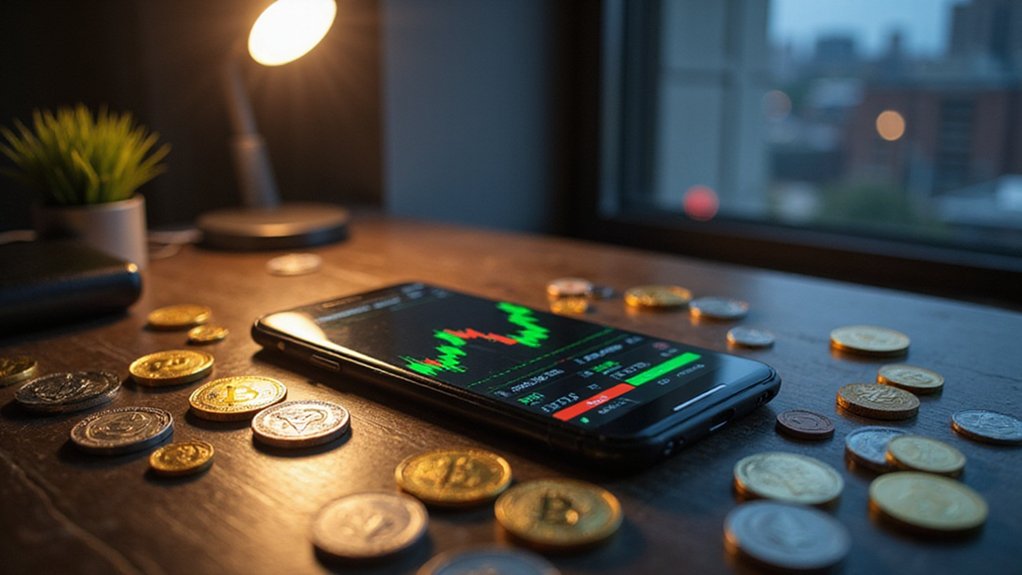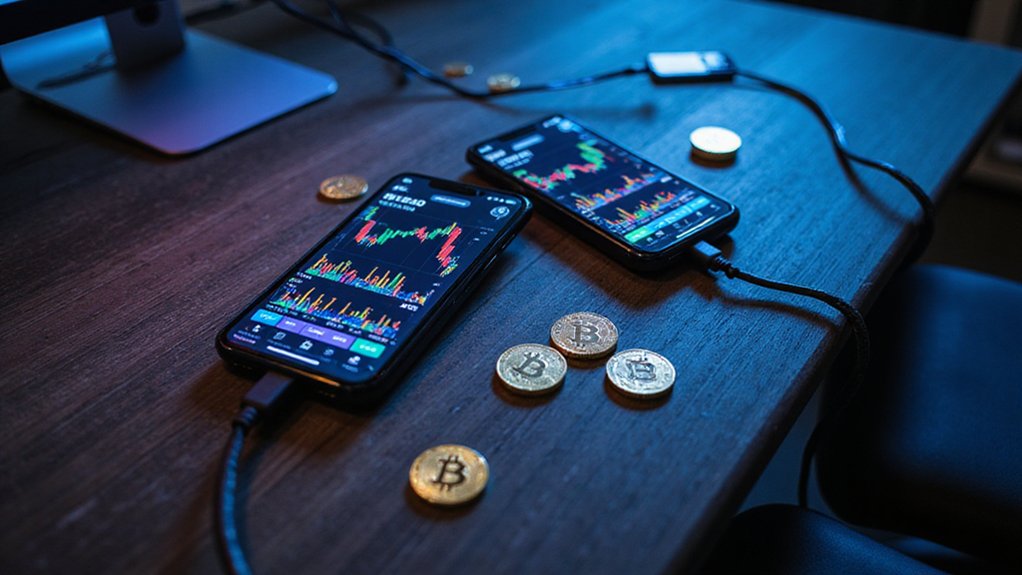The premier peer-to-peer cryptocurrency exchanges of 2024 have crystallized around platforms offering zero-fee models while spanning virtually every jurisdiction globally. Binance P2P leads with coverage across 180+ countries and extensive payment options, while OKX rewards active traders through tiered discounts and AI-enhanced security. KuCoin operates in over 200 countries with minimal fees, LocalBitcoins maintains its original peer-to-peer ethos across 190+ nations, and regional specialists like WazirX dominate specific markets—each platform’s unique strengths warrant closer examination.

The peer-to-peer cryptocurrency exchange landscape in 2024 presents a fascinating paradox: while traditional financial institutions continue their measured dance around digital assets, millions of users have quietly embraced platforms that facilitate direct crypto transactions without intermediaries.
Traditional banks hesitate while millions already trade crypto directly, bypassing institutional gatekeepers entirely.
These platforms have evolved beyond mere trading venues into sophisticated ecosystems where buyers and sellers navigate an increasingly complex web of payment methods, security protocols, and regulatory frameworks.
Binance P2P dominates this space with users spanning over 180 countries, offering the kind of global reach that would make traditional remittance services weep quietly into their fee structures.
The platform’s zero-fee model for P2P trades (a welcome departure from the nickel-and-diming prevalent elsewhere) combines with multiple payment options including bank transfers, cards, PayPal, and various e-wallets.
Their KYC requirements, while potentially tedious, provide the security framework that serious traders demand.
OKX similarly eschews trading fees while incorporating AI-enhanced security and smart contracts—because apparently even peer-to-peer trading now requires artificial intelligence to function properly.
The platform’s global availability (notable exception: the United States, naturally) includes staking and saving options for those seeking yield beyond simple transactions. Among centralized exchanges, OKX stands out for implementing tiered fee discounts that reward active traders and token holders with reduced trading costs.
Bybit and MEXC represent the newer generation of exchanges, with Bybit emphasizing speed and user experience while MEXC differentiates itself through regular airdrops and promotional campaigns—the cryptocurrency equivalent of grocery store loyalty programs, but with considerably more volatility.
KuCoin provides multilingual support across its global operations, featuring an extensive cryptocurrency selection that caters to both mainstream and exotic digital assets. The platform operates with remarkably low fees while serving users in over 200 countries and requiring KYC verification for enhanced security.
Meanwhile, WazirX has carved out particular dominance in India, offering 24/7 support and beginner-friendly interfaces that demystify what can be an intimidating process.
LocalBitcoins remains the elder statesman of this ecosystem, operating across 190+ countries with laser focus on Bitcoin exclusively.
Their 1% seller fee (buyers trade for free) and support for cash transactions represent both the platform’s longevity and its commitment to the original peer-to-peer vision that spawned this entire industry.
Each platform reflects different philosophies about how individuals should transact in an increasingly digital financial landscape.
Frequently Asked Questions
What Are the Typical Fees Charged by Peer-To-Peer Crypto Exchanges?
P2P crypto exchanges typically charge zero fees for peer-to-peer transactions themselves—a surprisingly transparent approach in an industry notorious for creative fee structures.
However, traders encounter charges for escrow services, specific payment methods, and platform features beyond basic P2P functionality.
While exchanges tout “zero fees,” astute users recognize that operational costs manifest elsewhere, whether through spreads, withdrawal fees, or premium services that somehow fund these ostensibly charitable platforms.
How Long Do P2P Crypto Transactions Usually Take to Complete?
P2P crypto transaction completion times span a remarkably wide spectrum, from Nano’s lightning-fast 0.2 seconds to Bitcoin’s potentially hour-long odysseys during network congestion.
Most transactions settle within 1-20 minutes, though this depends on the chosen cryptocurrency, network conditions, and—perhaps most importantly—whether human verification steps intervene.
Layer-2 solutions like Polygon offer sweet spots around 2 seconds, while escrow processes can extend timelines considerably when disputes arise.
What Happens if a P2P Trade Dispute Occurs Between Buyers and Sellers?
When P2P trade disputes emerge, exchanges typically activate tiered resolution protocols—beginning with automated escrow systems that freeze funds until both parties acknowledge completion.
Should initial mediation fail (surprisingly common given crypto’s “trustless” ethos), platforms escalate through user rating verification, internal arbitration, and ultimately external dispute resolution services.
The irony? These centralized mechanisms contradict crypto’s decentralized philosophy, yet remain essential safeguards against payment delays, delivery failures, and the inevitable scams plaguing peer-to-peer transactions.
Are Peer-To-Peer Crypto Exchanges Legal in My Country or Region?
P2P crypto exchange legality depends entirely on one’s jurisdiction—a delightfully fragmented regulatory landscape where neighboring countries might treat identical transactions as either perfectly legitimate commerce or suspicious financial activity.
While the U.S. and U.K. generally permit such exchanges (with appropriate licensing and compliance theater), many regions maintain conspicuous regulatory silence.
Smart traders verify local AML/KYC requirements before discovering their preferred platform suddenly requires geographical amnesia.
What Personal Information Is Required to Verify Accounts on P2P Platforms?
P2P platforms typically demand standard KYC documentation: full legal names, birthdates, residential addresses, and government-issued identification.
Enhanced verification often requires selfies for facial recognition, source-of-funds declarations, and transaction histories from other exchanges.
Some platforms offer limited-KYC options requiring only email addresses, though this convenience naturally restricts trading volumes and capabilities.
The regulatory environment dictates requirements—stricter jurisdictions mandate thorough documentation while permissive regions allow reduced verification, creating predictable compliance variations.









